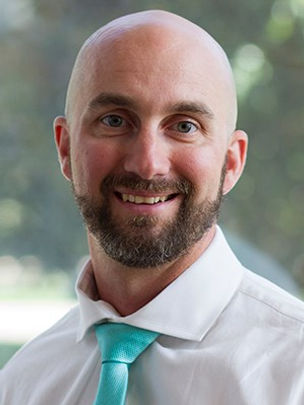
EXPERT ADVICE
ATHLETIC TRAINERS


Hey I'm Josh! I'm the head athletic trainer and Associate Athletic Director for Student Wellness at University of Texas at Dallas. I've been a certified athletic trainer for 14 years now and have worked in multiple at multiple universities, including Colorado State as an undergraduate and graduate student, interning at Northwestern University, as well as working full time at Boise State University, Oral Roberts University, Adam State University and now the University of Texas Dallas
JOSH DREHER
JOSH'S INTERVIEW
Can you give an estimate of how many injured athletes you see per season and out of those, how many are season-ending injuries?
In terms of season-ending injuries here at the University of Texas Dallas, my staff and I see probably about 5 to 10 season-ending type of injuries. But in terms of overall injuries, I personally probably see close to 750 different injuries during the school year.
What is the most common reaction you see from these seriously injured athletes immediately following the injury?
So, like any grieving type process, student-athletes tend to go through the same grieving process, as losing a loved one, or where they're really in denial, and then they're angry about it. They eventually get to the point where they come to terms with it and work their way through it emotionally and mentally.
How would you assess these player’s mental health as time passes?
It just depends on the student-athlete. For some student-athletes, it does get
better over time as they come to terms with the injury and how it's changing
their current status as a student-athlete; whereas with other students, it's more
like a rollercoaster and they, they will fall back into that denial and anger stage
as. Maybe a season gets started or a big game comes up that they really
wanted to play in or be a part of, and now that they're missing that, they really
have those issues come back to them, struggling to determine what what is
their identity without sports. A lot of student-athletes get back to their normal
state after they're cleared from their injury and gotten back into playing their
sport. So, an ACL for instance. Maybe they get cleared at 9 months, but
they're still not completely back to normal until they get to that point where
they're back out at practice every day and they can play without thinking
about about that injury. A lot of times when student-athletes first get back
from a big injury like that, they tend to play a little more timid and not as
aggressive because they're worried about potentially re-injuring. So that's
part of what we do as trainers in the rehab process, gradually building things
all the way up to functional drills and movements used at practice, but in a more controlled environment. Especially towards the end of that rehab process, we help them get their confidence back in their knee, their shoulder, their elbow, whatever we happen to be working with, so that they can go back to playing their sport without worrying about re-injuring.
Are there athletes to this day that still have hesitation playing their sport even after fully recovering from their injury?
Yeah, absolutely, depending on the injury and on the student athlete. For example, somebody has a femur fracture, which is a long-lasting traumatic injury because it involves such a big weight-bearing bone. If they come back from that injury, they are still mentally worried because they remember how much pain they were in and how long of a grueling process it was. That being said, student-athletes may not finish out their eligibility because they just can't completely get past it or they never get back to the level they were playing out before. Some student-athletes could also be worried about the financial costs that go along with a potential surgery or even if they physically can't go to work to earn money.
Do you often see athletes that are frustrated with not being able to perform as well as they did before injury?
There's definitely the frustration that they don't think they're as quick or strong as they were before. But if you really looked at a lot of the statistics, if their rehab was done properly by their physical therapists in conjunction with their athletic trainers, they should be just as strong or stronger as they were pre-injury. It just takes a lot longer. Then, okay you're cleared to go back to playing your sport but it may take another 6 to 12 months before you get that fast twitch muscle fibers working again, things like that. By that time, eligibility might run out so they don't fully get to see themselves back at that level prior to the injury.
What advice did you give to these athletes who were struggling?
We do give some feedback like, "Yes you're clear, but you're not going to be the same as you were prior to surgery or prior to that injury". We talk to them about being patient and continuing to work hard and put in the effort. I remind student-athletes that since they probably started playing their sport at 3 to 5 years old, it's taken potentially 10 to 15 years to really get to the level they were at. It's going to take an extra 6 months to a year to probably get completely back to that level that they were at before. It reassures them that their pre-injury athleticism doesn't just come back right away.
What is the biggest physical and mental roadblock you see as these athletes recover from their injury? (Can you see what causes most of their frustration?
A big physical roadblock is most likely the initial pain from an injury, but as time goes on people get tired of the monotony of the rehab. A lot of rehabs tend to be pretty slow, especially early on, but they get faster and faster the farther out from surgery or injury that you get. I think the biggest frustration relates to that identity of being an athlete. Not being able to play the sport that you've dedicated os many years of your life to can lead to different lifestyle changes, such as not being around their teammates (which are typically their closest friends) as much, or dissipating in other activities that they didn't do prior to being student-athletes, or picking up issues with drugs and alcohol as a coping mechanism.
Top 3 Recovery Tips
1. Stay Connected With Teammates
At practices alongside your teammates, you can workout on the things that you are physically capable of doing on the sidelines whether it's just abs, or upper body, to put in some kind of work to try and make yourself better every day. Then continue to spend time with teammates outside of practice as well so you don't feel as left out.
2. Stay Involved
Try to help out the coaches and potentially coach up your teammates. You're going to get a different view of things from the sideline than you are when you're actually out on the field or court.
3. Ask for Help
Don't be afraid to go ask somebody for extra help just to talk through, potentially, your identity issues, mental anguish that you're experiencing by missing out on your sport. You can go seek out help at your campus's resources such as the counseling center.
